人教版(2019)选择性必修第二册Unit 1 Science and Scientists Reading and Thinking 课件 (共29张PPT)
文档属性
| 名称 | 人教版(2019)选择性必修第二册Unit 1 Science and Scientists Reading and Thinking 课件 (共29张PPT) | 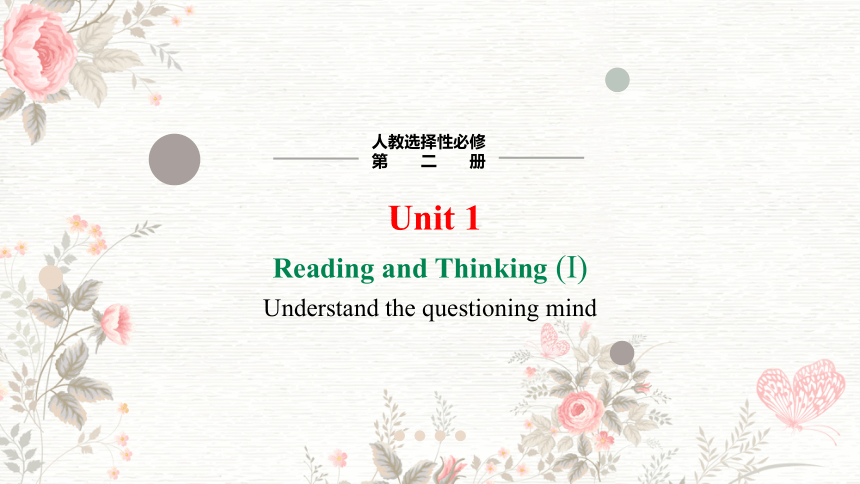 | |
| 格式 | pptx | ||
| 文件大小 | 10.4MB | ||
| 资源类型 | 教案 | ||
| 版本资源 | 人教版(2019) | ||
| 科目 | 英语 | ||
| 更新时间 | 2023-12-08 15:01:12 | ||
图片预览

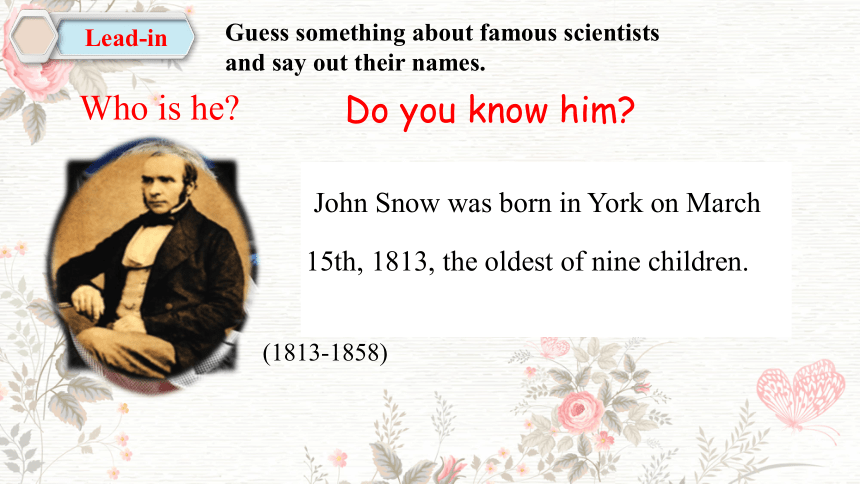
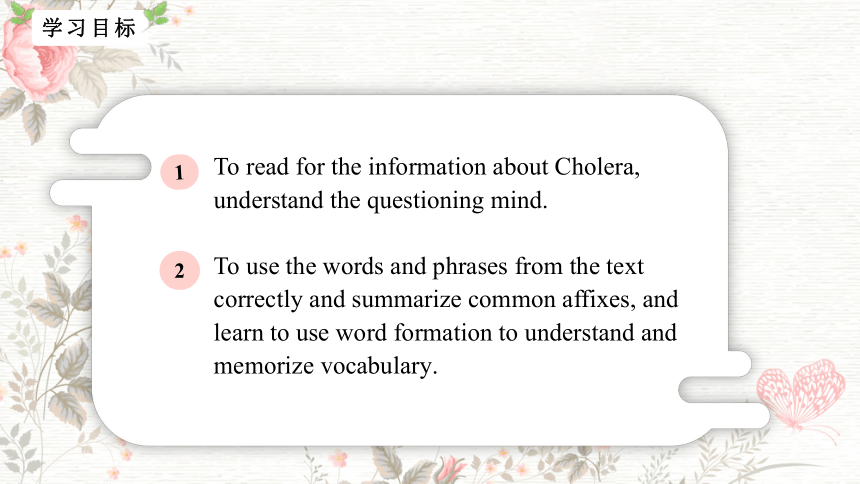
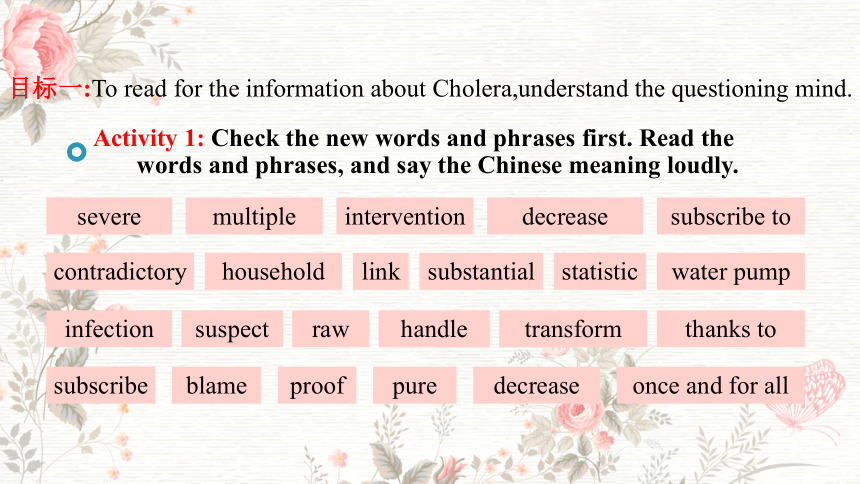
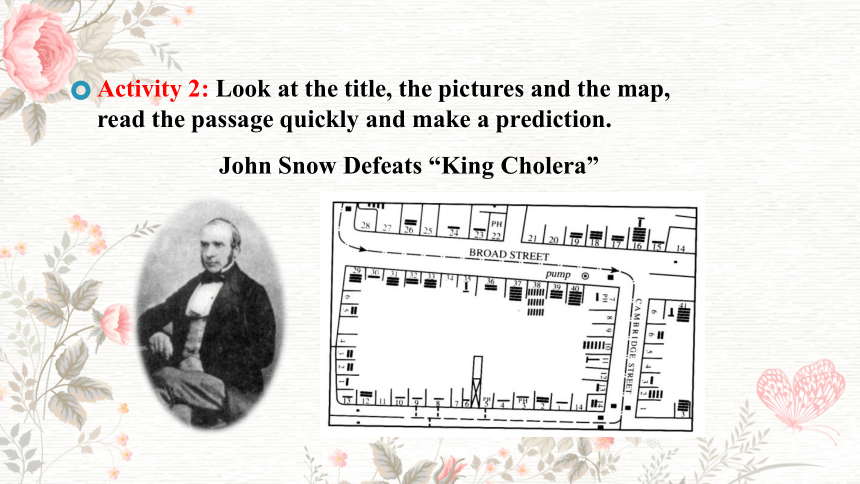
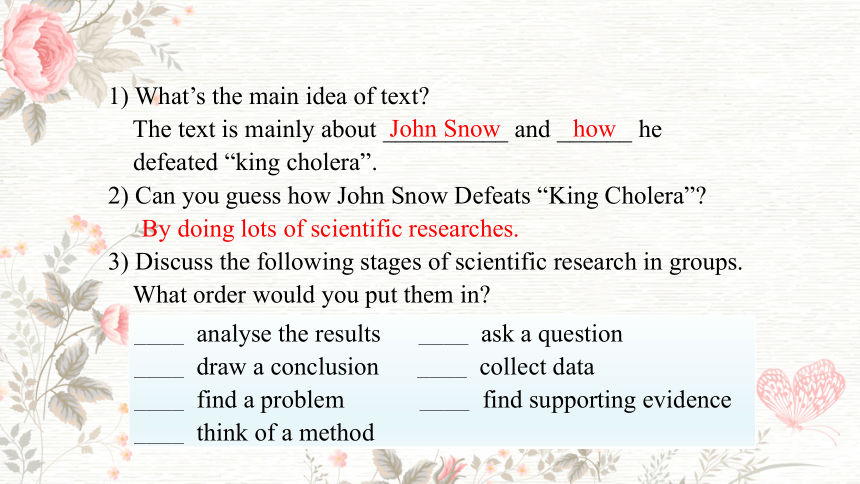
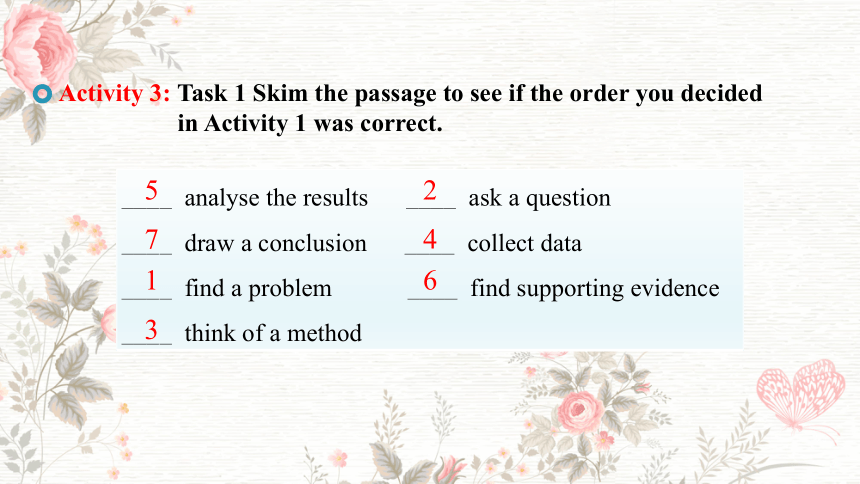
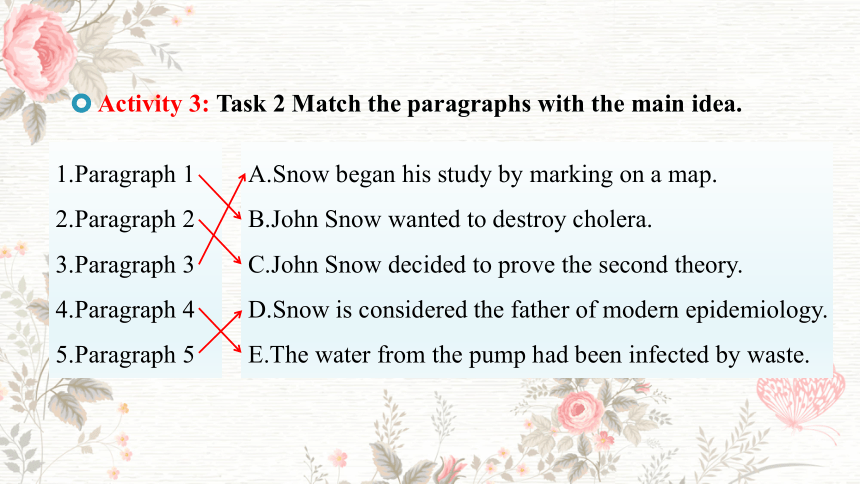
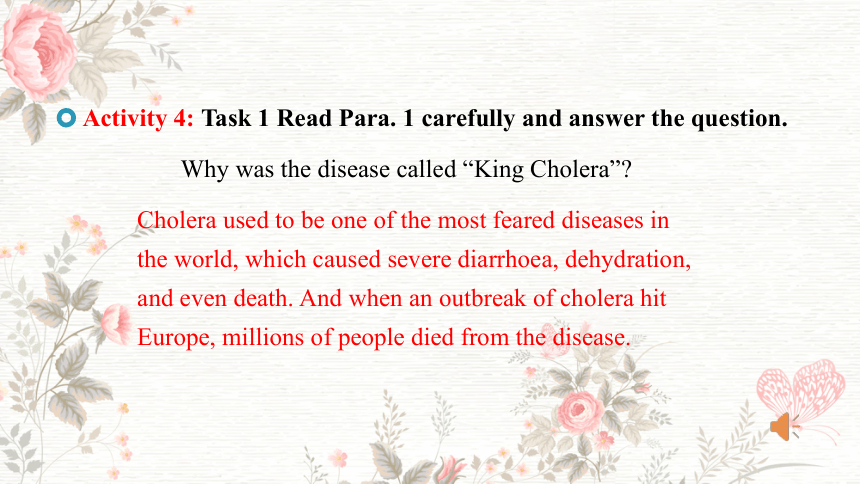
文档简介
(共29张PPT)
人教选择性必修第二册
Unit 1
Reading and Thinking (I)
Understand the questioning mind
教学目
Lead-in
Guess something about famous scientists
and say out their names.
Who is he
Archimedes (阿基米德)
Which scientist discovered that objects in water are lifted up by a force that helps them float
Who invented the light bulb
Thomas Edison
Who put forward a theory about black holes
Stephen Hawking
(1813-1858)
John Snow was born in York on March 15th, 1813, the oldest of nine children.
Do you know him
1
2
To read for the information about Cholera, understand the questioning mind.
To use the words and phrases from the text correctly and summarize common affixes, and learn to use word formation to understand and memorize vocabulary.
目标一:To read for the information about Cholera,understand the questioning mind.
Activity 1: Check the new words and phrases first. Read the
words and phrases, and say the Chinese meaning loudly.
severe
blame
transform
handle
decrease
raw
intervention
household
multiple
contradictory
statistic
subscribe
infection
proof
link
substantial
suspect
pure
subscribe to
decrease
once and for all
water pump
thanks to
Activity 2: Look at the title, the pictures and the map, read the passage quickly and make a prediction.
John Snow Defeats “King Cholera”
1) What’s the main idea of text
The text is mainly about __________ and ______ he
defeated “king cholera”.
2) Can you guess how John Snow Defeats “King Cholera”
3) Discuss the following stages of scientific research in groups.
What order would you put them in
By doing lots of scientific researches.
____ analyse the results ____ ask a question
____ draw a conclusion ____ collect data
____ find a problem ____ find supporting evidence
____ think of a method
John Snow
how
Activity 3: Task 1 Skim the passage to see if the order you decided
in Activity 1 was correct.
____ analyse the results ____ ask a question
____ draw a conclusion ____ collect data
____ find a problem ____ find supporting evidence
____ think of a method
5
4
3
2
1
6
7
Activity 3: Task 2 Match the paragraphs with the main idea.
1.Paragraph 1
2.Paragraph 2
3.Paragraph 3
4.Paragraph 4
5.Paragraph 5
A.Snow began his study by marking on a map.
B.John Snow wanted to destroy cholera.
C.John Snow decided to prove the second theory.
D.Snow is considered the father of modern epidemiology.
E.The water from the pump had been infected by waste.
Activity 4: Task 1 Read Para. 1 carefully and answer the question.
Why was the disease called “King Cholera”
Cholera used to be one of the most feared diseases in the world, which caused severe diarrhoea, dehydration, and even death. And when an outbreak of cholera hit Europe, millions of people died from the disease.
Activity 4: Task 2 Read Para 2 and Para 3 to complete the chart.
It was believed that cholera was caused by bad ________ or germs in __________.
A
Snow ________________ the places where the people who _________ had lived.
B
Many deaths occurred near the _________ in Broad Street.
Some people ________ drunk the water from the pump, and lived.
A woman and her daughter died in another part of London after ______________
__________________.
C
The pump water carried _____________.
The __________ of the pump was removed.
D
E
air
food or water
died
marked on a map
water pump
hadn’t
drinking water from the pump
cholera germs
handle
Activity 4: Task 3 Read Para 4 and Para 5 to answer the question.
Why Snow is considered the father of modern epidemiology
Because through Snow's tireless efforts, water companies began to sell clean water, and the threat of cholera around the world saw a substantial decrease; Moreover, in his use of maps and statistics, Snow transformed the way scientists study diseases.
Activity 5: Task 1 Match the following headers with the letters from the chart above. Write A-E in the blanks.
1 conclusion____ 2 evidence______ 3 process______
4 solution______ 5 theories______
D
E
B
A
C
Activity 5: Task 2 Write out the questions according to the answers.
1 Q: What______________________
A: Snow thought that cholera was caused by germs in food or water.
2 Q: Why__________________________________________
A: Snow had the handle from the pump removed so that it could not be used.
3 Q: How_____________________________
A: The cholera threat was defeated thanks to the work of John Snow.
caused the cholera
did Snow have the handle of the pump removed
was the cholera threat defeated
Ask questions
One way to approach a reading passage is to ask questions about it. Asking questions can help you understand the content. It can also help you think more deeply about the topic.
Activity 6: In groups, discuss the following questions.
1. What was the most important tool Snow used to defeat cholera
What common medical tools, e.g., a microscope, didn't he use Why
2. How has John Snow's work affected our daily lives
1. Maps and statistics. He didn't use the common medical tools such as a microscope was because they didn’t exist during his time. Further, understanding of germs and bacteria was still developing, and so he had to innovate methods himself based on the theory he believed.
2. His work can protect people from being killed by the severe disease. Further more, it told us we should protect our environment from being polluted.
人教选择性必修第二册
Unit 1
Reading and Thinking (II)
Build up your vocabulary
目标二: To use the words and phrases from the text correctly and summarize
common affixes, and learn to use word formation to understand and
memorize vocabulary.
Activity 1: Find the important words, phrases, and language points
you want to share their usage to your partner. Discuss in
groups and then share with the class.
1. In time, he rose to become a famous doctor, and even attended to
Queen Victoria when she gave birth.
(1) in time在本句中意为“经过一段时间之后;迟早;最后”。
e.g. You'll forget it in time.
in time 还有“来得及;及时”的意思。
e.g. I don't think we're going to make it in time for the match.
(2) rise在本句意为“变得重要(成功或有权力)"。
e.g. She quickly rose through the ranks to become head of marketing.
(3) attend to 此处意为“照顾;处理”。
e.g. In Wuhan, the doctors tried to attend to the critical patients
infected with coronavirus.
【注意】attend to sb和tend sb含义接近。
e.g. She was more interested in tending patients, publishing medical
research on care for women and children, and training the next
generation of doctors.
2. However, he never lost his desire to destroy cholera once and for all.
once and for all意为“彻底地:一劳永逸地”。
e.g. Now it is time to solve the problem of eating wild animals once
and for all.
Activity 2: Task 1 Guess the meaning of the word.
Pneumonoultramicroscopicsilicovolcanoconiosis
/ nju: m ( )n ltr mɑ kr ( )'sk p k s l k v l ke n k n ' s s/
of lung
肺的
to an extreme degree非常
small 微小的
of viewing or observing观察
或注意的
of silicon硅的
mountain that releases lava and ash
火山的
of dust尘土的
state of a disease疾病
Now do you think it possible for you to guess the meaning of the word
a lung disease caused by inhaling very fine ash
and sand dust. (肺尘病)
Task 2 Find the words from the previous pages with the following
prefixes or suffixes.Then add two words for each prefix or
suffix, and explain their meanings.
Prefix Words Prefix Words Suffix Words Suffix Words
re- micro- -ory -ial
dis- trans- -ion -ology
remove,
replace,
reuse
discover,
disable,
disappear
microscope,
microwave,
microphone
transform,
transport,
transplant
contradictory,
advisory,
compulsory
infection,
action,
relation
substantial,
partial,
financial
epidemiology,
biology,
sociology
Task 3 Then answer the questions and fill the table.
What do the prefixes “re-/dis-/micro-/trans-" mean
Can you think of more words beginning with these prefixes
Do they change the meaning of the root word
Do they change the part of speech of the root word
What do the suffixes "-ory/-ion/-ial/-ology” mean
Can you think of more words ending with these suffixes
Do they change the meaning of the root word
Do they change the part of speech of the root word
Affix Meaning Examples Change
prefix re-
dis-
micro-
trans-
complete change; through, across
again
not
small
transform, transplant,
transport
reunite, revise, recover,
react, recall
discover, disappear,
dislike, disable
microscope, microwave,
microphone
meaning
Affix Meaning Examples Change
suffix -ory
-ion
-ial
-ology
a branch of knowledge
of or relating to
action or process
having the
characteristics of
epidemiology, biology,
physiology
contradictory, advisory,
compulsory
infection, contribution,
extinction, reaction
substantial, financial,
official, commercial
part of
speech
Activity 3: Task 1 Make phrases by combining the words in the left
box with those on the right.
subscribe
suspect
blame
link
for
to
of
Tips: Understand and use the “verb + preposition” blocks as a whole.
Task 2 Then complete the sentences using these phrases.
subscribe suspect blame link to of for
1 Many scientists ____________ the view that it is human activity that
has caused global warming.
2 He was to _________ the accident because he drove on the wrong side
of the road.
3 The man ____________ being behind the robbery was seen crossing
the street.
4 Since heart disease is often _________ our lifestyle choices, we need
to make healthy living an important part of our lives.
subscribe to
blame for
suspected of
linked to
Activity 4: Replace the underlined parts with suitable words
from the box.
raw a household name substantial statistics handle
1.It is not unusual for an athlete to be well-known while he is active, and quickly forgotten when his athletic career is over.
2.I'm sure she’ll deal with the changes very well because she's very adaptable.
3.He was ready to serve dinner to his friends when he realised that he had forgotten to turn on the oven and the meat was not cooked yet.
4.He used his great influence to change the thinking of the scientific community on this issue.
5.Scientists have collected more data than expected to prove the theory.
a household name
handle
raw
substantial
statistics
Activity 5: Read this passage about medical plete
it using the words below.
infection multiple decrease severe transform proof blame substantial
British scientists believe they may have found a way to fight the common cold. It blocks a key protein in the body's cells that is to __________ for the spread of cold-causing virus.Targeting the host rather than the __________ was a bit non-traditional but made sense because it was tricky to target the virus. Cold-causing virus are not only of __________ kinds, they also __________ rapidly, meaning they can quickly develop resistance to medicine. Researchers are working on making a form of medicine that can be taken directly into one's lungs, to __________ the chance of side effects. Though these scientists have made __________ advances in their research, further __________ is needed to make sure such drugs are not so __________ that they harm the body.
blame
infection
multiple
transform
decrease
substantial
proof
severe
Retell how John Snow defeated cholera.
人教选择性必修第二册
Unit 1
Reading and Thinking (I)
Understand the questioning mind
教学目
Lead-in
Guess something about famous scientists
and say out their names.
Who is he
Archimedes (阿基米德)
Which scientist discovered that objects in water are lifted up by a force that helps them float
Who invented the light bulb
Thomas Edison
Who put forward a theory about black holes
Stephen Hawking
(1813-1858)
John Snow was born in York on March 15th, 1813, the oldest of nine children.
Do you know him
1
2
To read for the information about Cholera, understand the questioning mind.
To use the words and phrases from the text correctly and summarize common affixes, and learn to use word formation to understand and memorize vocabulary.
目标一:To read for the information about Cholera,understand the questioning mind.
Activity 1: Check the new words and phrases first. Read the
words and phrases, and say the Chinese meaning loudly.
severe
blame
transform
handle
decrease
raw
intervention
household
multiple
contradictory
statistic
subscribe
infection
proof
link
substantial
suspect
pure
subscribe to
decrease
once and for all
water pump
thanks to
Activity 2: Look at the title, the pictures and the map, read the passage quickly and make a prediction.
John Snow Defeats “King Cholera”
1) What’s the main idea of text
The text is mainly about __________ and ______ he
defeated “king cholera”.
2) Can you guess how John Snow Defeats “King Cholera”
3) Discuss the following stages of scientific research in groups.
What order would you put them in
By doing lots of scientific researches.
____ analyse the results ____ ask a question
____ draw a conclusion ____ collect data
____ find a problem ____ find supporting evidence
____ think of a method
John Snow
how
Activity 3: Task 1 Skim the passage to see if the order you decided
in Activity 1 was correct.
____ analyse the results ____ ask a question
____ draw a conclusion ____ collect data
____ find a problem ____ find supporting evidence
____ think of a method
5
4
3
2
1
6
7
Activity 3: Task 2 Match the paragraphs with the main idea.
1.Paragraph 1
2.Paragraph 2
3.Paragraph 3
4.Paragraph 4
5.Paragraph 5
A.Snow began his study by marking on a map.
B.John Snow wanted to destroy cholera.
C.John Snow decided to prove the second theory.
D.Snow is considered the father of modern epidemiology.
E.The water from the pump had been infected by waste.
Activity 4: Task 1 Read Para. 1 carefully and answer the question.
Why was the disease called “King Cholera”
Cholera used to be one of the most feared diseases in the world, which caused severe diarrhoea, dehydration, and even death. And when an outbreak of cholera hit Europe, millions of people died from the disease.
Activity 4: Task 2 Read Para 2 and Para 3 to complete the chart.
It was believed that cholera was caused by bad ________ or germs in __________.
A
Snow ________________ the places where the people who _________ had lived.
B
Many deaths occurred near the _________ in Broad Street.
Some people ________ drunk the water from the pump, and lived.
A woman and her daughter died in another part of London after ______________
__________________.
C
The pump water carried _____________.
The __________ of the pump was removed.
D
E
air
food or water
died
marked on a map
water pump
hadn’t
drinking water from the pump
cholera germs
handle
Activity 4: Task 3 Read Para 4 and Para 5 to answer the question.
Why Snow is considered the father of modern epidemiology
Because through Snow's tireless efforts, water companies began to sell clean water, and the threat of cholera around the world saw a substantial decrease; Moreover, in his use of maps and statistics, Snow transformed the way scientists study diseases.
Activity 5: Task 1 Match the following headers with the letters from the chart above. Write A-E in the blanks.
1 conclusion____ 2 evidence______ 3 process______
4 solution______ 5 theories______
D
E
B
A
C
Activity 5: Task 2 Write out the questions according to the answers.
1 Q: What______________________
A: Snow thought that cholera was caused by germs in food or water.
2 Q: Why__________________________________________
A: Snow had the handle from the pump removed so that it could not be used.
3 Q: How_____________________________
A: The cholera threat was defeated thanks to the work of John Snow.
caused the cholera
did Snow have the handle of the pump removed
was the cholera threat defeated
Ask questions
One way to approach a reading passage is to ask questions about it. Asking questions can help you understand the content. It can also help you think more deeply about the topic.
Activity 6: In groups, discuss the following questions.
1. What was the most important tool Snow used to defeat cholera
What common medical tools, e.g., a microscope, didn't he use Why
2. How has John Snow's work affected our daily lives
1. Maps and statistics. He didn't use the common medical tools such as a microscope was because they didn’t exist during his time. Further, understanding of germs and bacteria was still developing, and so he had to innovate methods himself based on the theory he believed.
2. His work can protect people from being killed by the severe disease. Further more, it told us we should protect our environment from being polluted.
人教选择性必修第二册
Unit 1
Reading and Thinking (II)
Build up your vocabulary
目标二: To use the words and phrases from the text correctly and summarize
common affixes, and learn to use word formation to understand and
memorize vocabulary.
Activity 1: Find the important words, phrases, and language points
you want to share their usage to your partner. Discuss in
groups and then share with the class.
1. In time, he rose to become a famous doctor, and even attended to
Queen Victoria when she gave birth.
(1) in time在本句中意为“经过一段时间之后;迟早;最后”。
e.g. You'll forget it in time.
in time 还有“来得及;及时”的意思。
e.g. I don't think we're going to make it in time for the match.
(2) rise在本句意为“变得重要(成功或有权力)"。
e.g. She quickly rose through the ranks to become head of marketing.
(3) attend to 此处意为“照顾;处理”。
e.g. In Wuhan, the doctors tried to attend to the critical patients
infected with coronavirus.
【注意】attend to sb和tend sb含义接近。
e.g. She was more interested in tending patients, publishing medical
research on care for women and children, and training the next
generation of doctors.
2. However, he never lost his desire to destroy cholera once and for all.
once and for all意为“彻底地:一劳永逸地”。
e.g. Now it is time to solve the problem of eating wild animals once
and for all.
Activity 2: Task 1 Guess the meaning of the word.
Pneumonoultramicroscopicsilicovolcanoconiosis
/ nju: m ( )n ltr mɑ kr ( )'sk p k s l k v l ke n k n ' s s/
of lung
肺的
to an extreme degree非常
small 微小的
of viewing or observing观察
或注意的
of silicon硅的
mountain that releases lava and ash
火山的
of dust尘土的
state of a disease疾病
Now do you think it possible for you to guess the meaning of the word
a lung disease caused by inhaling very fine ash
and sand dust. (肺尘病)
Task 2 Find the words from the previous pages with the following
prefixes or suffixes.Then add two words for each prefix or
suffix, and explain their meanings.
Prefix Words Prefix Words Suffix Words Suffix Words
re- micro- -ory -ial
dis- trans- -ion -ology
remove,
replace,
reuse
discover,
disable,
disappear
microscope,
microwave,
microphone
transform,
transport,
transplant
contradictory,
advisory,
compulsory
infection,
action,
relation
substantial,
partial,
financial
epidemiology,
biology,
sociology
Task 3 Then answer the questions and fill the table.
What do the prefixes “re-/dis-/micro-/trans-" mean
Can you think of more words beginning with these prefixes
Do they change the meaning of the root word
Do they change the part of speech of the root word
What do the suffixes "-ory/-ion/-ial/-ology” mean
Can you think of more words ending with these suffixes
Do they change the meaning of the root word
Do they change the part of speech of the root word
Affix Meaning Examples Change
prefix re-
dis-
micro-
trans-
complete change; through, across
again
not
small
transform, transplant,
transport
reunite, revise, recover,
react, recall
discover, disappear,
dislike, disable
microscope, microwave,
microphone
meaning
Affix Meaning Examples Change
suffix -ory
-ion
-ial
-ology
a branch of knowledge
of or relating to
action or process
having the
characteristics of
epidemiology, biology,
physiology
contradictory, advisory,
compulsory
infection, contribution,
extinction, reaction
substantial, financial,
official, commercial
part of
speech
Activity 3: Task 1 Make phrases by combining the words in the left
box with those on the right.
subscribe
suspect
blame
link
for
to
of
Tips: Understand and use the “verb + preposition” blocks as a whole.
Task 2 Then complete the sentences using these phrases.
subscribe suspect blame link to of for
1 Many scientists ____________ the view that it is human activity that
has caused global warming.
2 He was to _________ the accident because he drove on the wrong side
of the road.
3 The man ____________ being behind the robbery was seen crossing
the street.
4 Since heart disease is often _________ our lifestyle choices, we need
to make healthy living an important part of our lives.
subscribe to
blame for
suspected of
linked to
Activity 4: Replace the underlined parts with suitable words
from the box.
raw a household name substantial statistics handle
1.It is not unusual for an athlete to be well-known while he is active, and quickly forgotten when his athletic career is over.
2.I'm sure she’ll deal with the changes very well because she's very adaptable.
3.He was ready to serve dinner to his friends when he realised that he had forgotten to turn on the oven and the meat was not cooked yet.
4.He used his great influence to change the thinking of the scientific community on this issue.
5.Scientists have collected more data than expected to prove the theory.
a household name
handle
raw
substantial
statistics
Activity 5: Read this passage about medical plete
it using the words below.
infection multiple decrease severe transform proof blame substantial
British scientists believe they may have found a way to fight the common cold. It blocks a key protein in the body's cells that is to __________ for the spread of cold-causing virus.Targeting the host rather than the __________ was a bit non-traditional but made sense because it was tricky to target the virus. Cold-causing virus are not only of __________ kinds, they also __________ rapidly, meaning they can quickly develop resistance to medicine. Researchers are working on making a form of medicine that can be taken directly into one's lungs, to __________ the chance of side effects. Though these scientists have made __________ advances in their research, further __________ is needed to make sure such drugs are not so __________ that they harm the body.
blame
infection
multiple
transform
decrease
substantial
proof
severe
Retell how John Snow defeated cholera.
